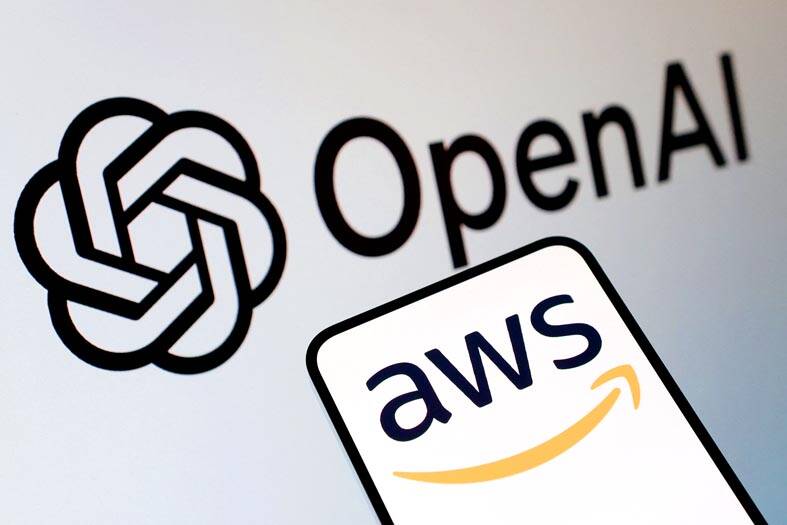OpenAI and Amazon.com Inc have signed a US$38 billion deal that enables the ChatGPT maker to run its artificial intelligence (AI) systems on Amazon’s data centers in the US.
OpenAI would be able to power its AI tools using “hundreds of thousands” of Nvidia Corp’s specialized AI chips through Amazon Web Services (AWS) as part of the deal announced on Monday.
The agreement comes less than a week after OpenAI altered its partnership with its longtime backer Microsoft Corp, which until early this year was the start-up’s exclusive cloud computing provider.

Photo: Reuters
California and Delaware regulators also last week allowed San Francisco-based OpenAI, which was founded as a nonprofit, to move forward on its plan to form a new business structure to more easily raise capital and make a profit.
“The rapid advancement of AI technology has created unprecedented demand for computing power,” Amazon said in a statement on Monday.
It said OpenAI “will immediately start utilizing AWS compute as part of this partnership, with all capacity targeted to be deployed before the end of 2026, and the ability to expand further into 2027 and beyond.”
AI requires huge amounts of energy and computing power, and OpenAI has long signaled that it needs more capacity to develop new AI systems and keep existing products such as ChatGPT answering the questions of its hundreds of millions of users. It has recently made more than US$1 trillion worth of financial obligations in spending for AI infrastructure, including data center projects with Oracle Corp and Softbank Group Corp and semiconductor supply deals with chipmakers Nvidia, Advanced Micro Devices Inc and Broadcom Inc.
Some of the deals have raised investor concerns about their “circular” nature, since OpenAI does not make a profit and cannot yet afford to pay for the infrastructure that its cloud backers are providing on the expectations of future returns on their investments.
OpenAI CEO Sam Altman last week dismissed doubters he says have aired “breathless concern” about the deals.
“Revenue is growing steeply. We are taking a forward bet that it’s going to continue to grow,” Altman said on a podcast where he appeared with Microsoft CEO Satya Nadella.
Amazon is already the primary cloud provider to AI start-up Anthropic PBC, an OpenAI rival that makes the Claude chatbot.

SEMICONDUCTORS: The German laser and plasma generator company will expand its local services as its specialized offerings support Taiwan’s semiconductor industries Trumpf SE + Co KG, a global leader in supplying laser technology and plasma generators used in chip production, is expanding its investments in Taiwan in an effort to deeply integrate into the global semiconductor supply chain in the pursuit of growth. The company, headquartered in Ditzingen, Germany, has invested significantly in a newly inaugurated regional technical center for plasma generators in Taoyuan, its latest expansion in Taiwan after being engaged in various industries for more than 25 years. The center, the first of its kind Trumpf built outside Germany, aims to serve customers from Taiwan, Japan, Southeast Asia and South Korea,

Gasoline and diesel prices at domestic fuel stations are to fall NT$0.2 per liter this week, down for a second consecutive week, CPC Corp, Taiwan (台灣中油) and Formosa Petrochemical Corp (台塑石化) announced yesterday. Effective today, gasoline prices at CPC and Formosa stations are to drop to NT$26.4, NT$27.9 and NT$29.9 per liter for 92, 95 and 98-octane unleaded gasoline respectively, the companies said in separate statements. The price of premium diesel is to fall to NT$24.8 per liter at CPC stations and NT$24.6 at Formosa pumps, they said. The price adjustments came even as international crude oil prices rose last week, as traders

Taiwan Semiconductor Manufacturing Co (TSMC, 台積電), which supplies advanced chips to Nvidia Corp and Apple Inc, yesterday reported NT$1.046 trillion (US$33.1 billion) in revenue for last quarter, driven by constantly strong demand for artificial intelligence (AI) chips, falling in the upper end of its forecast. Based on TSMC’s financial guidance, revenue would expand about 22 percent sequentially to the range from US$32.2 billion to US$33.4 billion during the final quarter of 2024, it told investors in October last year. Last year in total, revenue jumped 31.61 percent to NT$3.81 trillion, compared with NT$2.89 trillion generated in the year before, according to

PRECEDENTED TIMES: In news that surely does not shock, AI and tech exports drove a banner for exports last year as Taiwan’s economic growth experienced a flood tide Taiwan’s exports delivered a blockbuster finish to last year with last month’s shipments rising at the second-highest pace on record as demand for artificial intelligence (AI) hardware and advanced computing remained strong, the Ministry of Finance said yesterday. Exports surged 43.4 percent from a year earlier to US$62.48 billion last month, extending growth to 26 consecutive months. Imports climbed 14.9 percent to US$43.04 billion, the second-highest monthly level historically, resulting in a trade surplus of US$19.43 billion — more than double that of the year before. Department of Statistics Director-General Beatrice Tsai (蔡美娜) described the performance as “surprisingly outstanding,” forecasting export growth